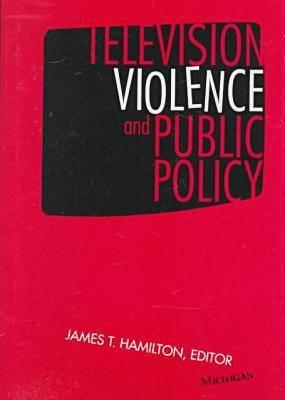

 University of Michigan Press
University of Michigan Press
Television Violence and Public Policy


Key Metrics
- James T Hamilton
- University of Michigan Press
- Hardcover
- 9780472109036
- 9.32 X 6.36 X 1.28 inches
- 1.65 pounds
- Political Science > Public Policy - General
- English
 Secure Transaction
Secure TransactionBook Description
The essays in the volume provide answers to many of these questions on specific policy issues surrounding media violence. The contributors suggest that the research on television violence can serve as the basis for a framework that categorizes programs based on the context in which the violence is presented. The manner in which information is conveyed about violent content affects how viewers react to such warnings. Program warnings with MPAA-style ratings have the potential to confuse parents (since they do not provide detailed content information) and attract some viewers such as teenage males.
The contributors include some of the top researchers in the field of communications, several of whom participated in the National Television Violence Study. Contributors are Eva Blumenthal, Joanne Cantor, Wayne Danielson, Ed Donnerstein, Tim Gray, Kristen Harrison, Cynthia Hoffner, Marlies Klijn, Marina Krcmar, Dale Kunkel, Dominic Lasorsa, Rafael Lopez, Dan Linz, Adriana Olivarez, James Potter, Stacy Smith, Matthew L. Spitzer, Ellen Wartella, D. Charles Whitney, and Barbara Wilson.
This volume will be of interest to communications researchers, media policy experts, legal scholars, government and industry officials, and social scientists interested in media and television.
James Hamilton is Director of the Program on Violence and the Media, Duke University.
Author Bio
James T. Hamilton is the Hearst Professor of Communication, Chair of the Department of Communication, and Director of the Stanford Journalism Program.
His books on media markets and information provision include All the News That’s Fit to Sell: How the Market Transforms Information into News (Princeton, 2004), Regulation Through Revelation: The Origin, Politics, and Impacts of the Toxics Release Inventory Program (Cambridge, 2005), and Channeling Violence: The Economic Market for Violent Television Programming (Princeton, 1998). His most recent book, Democracy's Detectives: The Economics of Investigative Journalism (Harvard, 2016), focuses on the market for investigative reporting. Through research in the field of computational journalism, he is also exploring how the costs of story discovery can be lowered through better use of data and algorithms.
He is co-founder of the Stanford Computational Journalism Lab, Senior Fellow at the Stanford Institute for Economic Policy Research, affiliated faculty at the Brown Institute for Media Innovation, and member of the JSK Fellowships Board of Visitors.
For his accomplishments in research, he has won awards such as the David N Kershaw Award of the Association for Public Policy Analysis and Management, the Goldsmith Book Prize from the Kennedy School’s Shorenstein Center (twice), the Frank Luther Mott Research Award (twice), the Tankard Book Award, and a Center for Advanced Study in the Behavioral Sciences Fellowship.
Teaching awards from Harvard, Duke, and Stanford include the Allyn Young Prize for Excellence in Teaching the Principles of Economics, Trinity College Distinguished Teaching Award, Bass Society of Fellows, Susan Tifft Undergraduate Teaching and Mentoring Award, and School of Humanities and Sciences Dean's Award for Distinguished Teaching.
Prior to joining the Stanford faculty, Hamilton taught at Duke University’s Sanford School of Public Policy, where he directed the De Witt Wallace Center for Media and Democracy. He earned a BA in Economics and Government (summa cum laude) and PhD in Economics from Harvard University.
Education
Ph.D., Harvard University, Economics (1991)
B.A., Harvard University, Economics and Government (1983)
Source: Stanford University
Videos




Community reviews
Write a ReviewNo Community reviews